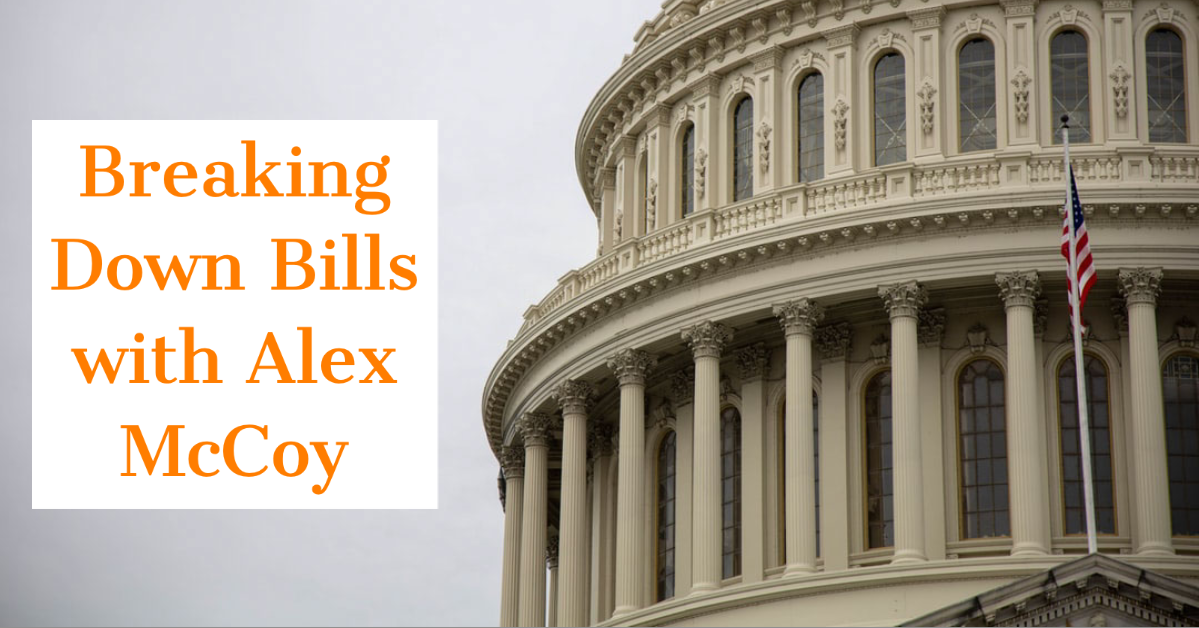Breaking Down Bills with Alex McCoy: H.R.4372 – MSI STEM Achievement Act

Keeping up with congress can be a challenge, even when things seem to move at a snail’s pace. The slow pace, combined with all the small text filled with jargon, can really be a turn-off for a lot of people. As a result, most people can’t really be bothered to know, or care, about what their representatives are up to. But staying up to date on what’s happening in congress helps you make informed decisions as a voter, and your vote is so important (p.s. if you’re not registered to vote in Texas, get your application here). Many bills pass without our knowledge and these laws can affect our lives significantly. That’s why I’ve decided to start a new series “Breaking Down Bills,” where I’ll give a brief detail about legislation and why I think it’s important to know about. To start, I’d like to highlight one bill currently making its way through congress because of its potential impact on graduate students and the higher education community. The bill, titled MSI STEM Achievement Act aims to increase diversity in the STEM workforce. See below for the break-down:
 Summary This bill supports efforts to increase science, technology, engineering, and mathematics (STEM) education at minority-serving institutions of higher education (IHEs). It requires the National Science Foundation to award grants for enhancing IHEs to increase the number of students in the STEM workforce and promote their success.
Summary This bill supports efforts to increase science, technology, engineering, and mathematics (STEM) education at minority-serving institutions of higher education (IHEs). It requires the National Science Foundation to award grants for enhancing IHEs to increase the number of students in the STEM workforce and promote their success.
Current status This bill has been approved by the house of representatives and moved on to the senate as of December 10th, 2019. It has been referred to the Committee on Health, Education, Labor, and Pensions for review.
Who supports it? This bill is sponsored by representative Eddie Bernice Johnson (D-TX-30; pictured below). She represents the Dallas area (30th congressional district) and has been representing this district since 1993. This bill has bipartisan support; it is cosponsored by 12 other representatives, of both republican and democratic parties.
Why do we need this bill? The demand for STEM workers is high, yet the supply of STEM workers is not keeping pace with the demand. This deficit is called “STEM skills shortage.”
The STEM workforce does not reflect the diversity of the nation; racial and ethnic minorities are significantly underrepresented in the STEM workforce.
Historically Black Colleges and Universities (HBCUs), Minority Serving Institutions (MSIs) and Tribal Colleges and Universities (TCUs) make educating underrepresented minorities part of their mission statements, this bill will provide support for these institutions and encourage other universities to promote participation of underrepresented minorities in STEM programs.
What the bill will do According to sponsors, the bill includes “enhancements to undergraduate STEM curriculum at HBCUs, TCUs, and MSIs to increase the participation, retention, degree completion, and success of underrepresented students” but how is it actually going to help?
These “enhancements” include competitive funding for HBCU’s, TCUs, and MSIs to promote research and training, and create a new position to ensure each institution upholds their responsibilities. This liaison is responsible for communications between the government and institutions, tracking investments in and progress STEM programs, conducting on-site reviews of research facilities, and facilitation collaborations between the institutions and organizations to promote minority participation and success in STEM.
For more information regarding the bill, or to check on the current status, click here.
Opinion Transforming our STEM workforce to one which reflects the population of the country is not just a noble cause, but a moral imperative. The lack of racial and ethnic minority representation in STEM fields may discourage further participation – the consequence of which is a loss of desperately-needed talent in the sciences, which negatively impacts everyone. The MSI STEM Achievement Act is one step towards this goal, but it is not a perfect solution. For example, giving aid to MSIs, HBCUs, and TCUs is an easy way to help target populations, but fails to serve racial and ethnic minorities that attend other institutions. It also targets students at the level of higher education, but these are already high-achieving individuals and it may be beneficial to emphasize STEM education at an earlier stage. Despite these minor shortcomings, I think this bill is larger than the budget it funnels towards STEM education at MSIs. It sends a message that we recognize an imbalance and are taking steps to correct it. It says we care, we are willing to invest in you, and we believe in you, which is a powerful message.
About the Author
 Alex McCoy is a student in the Neuroscience discipline of the Integrated Biomedical Sciences Ph.D. program. She is currently in the lab of Dr. Alan Frazer where she is working on using ketamine as a novel antidepressant. She is passionate about science policy. To read an article about her, check out “Alex McCoy: We Need To Create Better Antidepressants.”
Alex McCoy is a student in the Neuroscience discipline of the Integrated Biomedical Sciences Ph.D. program. She is currently in the lab of Dr. Alan Frazer where she is working on using ketamine as a novel antidepressant. She is passionate about science policy. To read an article about her, check out “Alex McCoy: We Need To Create Better Antidepressants.”
The “Beyond The Bench” series features articles written by students and postdoctoral fellows at the Graduate School of Biomedical Sciences at The University of Texas Health Science Center San Antonio.
